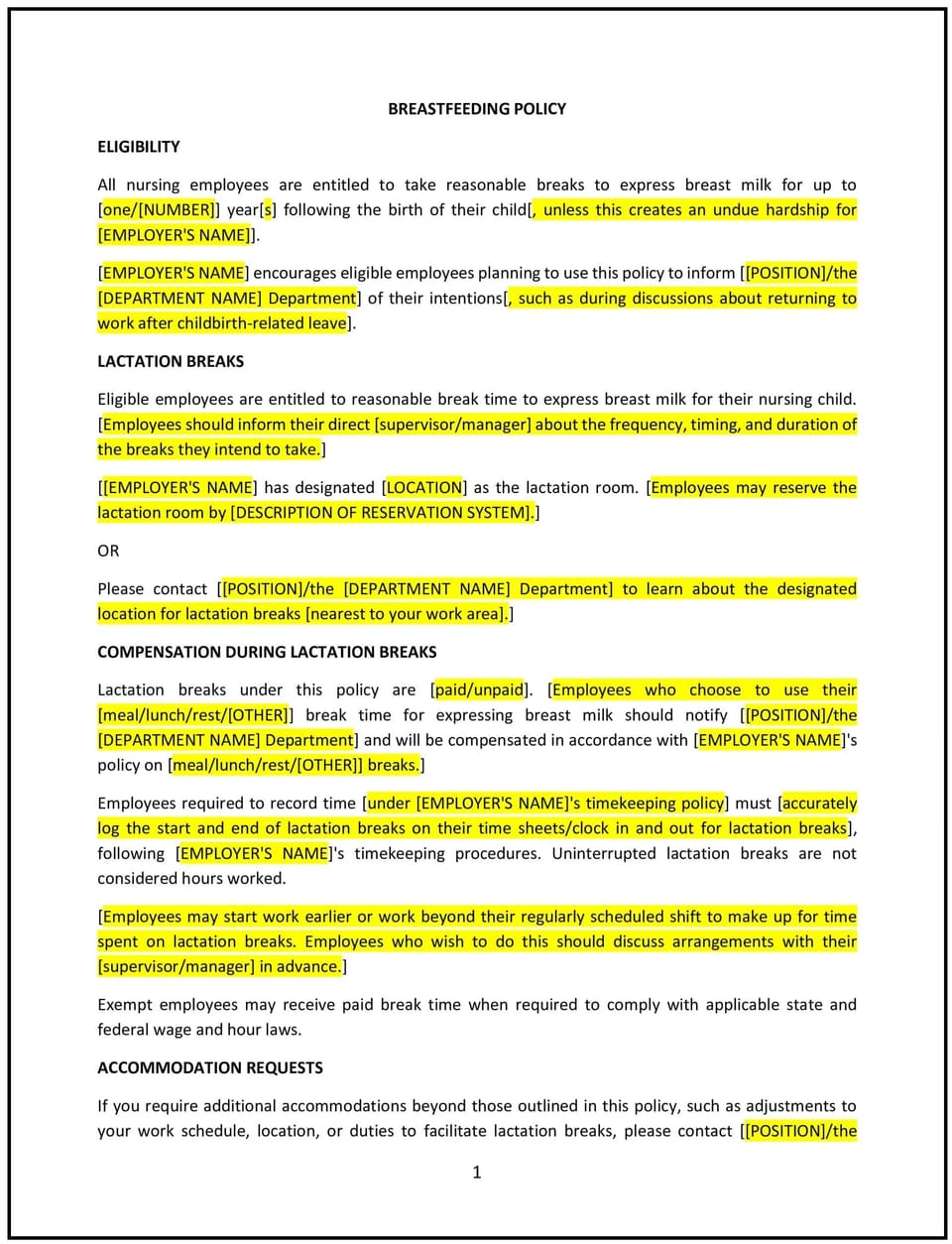Breastfeeding break policy (Arizona): Free template

Breastfeeding break policy (Arizona)
In Arizona, a breastfeeding break policy ensures businesses comply with state and federal laws, including the Fair Labor Standards Act (FLSA), by providing nursing employees with reasonable break times and private spaces to express breast milk during work hours. This policy supports working parents, promotes workplace inclusivity, and aligns with best practices for employee well-being.
This policy outlines the rights of nursing employees, the employer’s obligations, and the procedures for scheduling and accessing breastfeeding breaks. By implementing a clear policy, businesses in Arizona can foster a supportive work environment while maintaining compliance.
How to use this breastfeeding break policy (Arizona)
- Define entitlements: Clearly state that nursing employees are entitled to reasonable break times and a private, non-bathroom space for expressing milk.
- Provide scheduling guidelines: Encourage flexibility in scheduling breastfeeding breaks, allowing employees to coordinate with their supervisors as needed.
- Ensure adequate facilities: Specify the requirements for the private space, such as cleanliness, privacy, and access to electricity for breast pumps.
- Communicate expectations: Inform employees and managers about the policy, ensuring everyone understands their roles and responsibilities.
- Monitor compliance: Regularly review practices to ensure the policy is consistently applied and meets legal requirements.
Benefits of using a breastfeeding break policy (Arizona)
This policy offers several advantages for Arizona businesses:
- Supports compliance: Aligns with Arizona’s breastfeeding laws and federal requirements, minimizing legal risks.
- Promotes employee well-being: Supports nursing employees in balancing work and family responsibilities, enhancing morale and retention.
- Increases productivity: Reduces stress and absenteeism by providing nursing employees with the resources they need.
- Enhances inclusivity: Demonstrates the organization’s commitment to a supportive and family-friendly workplace.
- Protects reputation: Establishes the business as an employer of choice, fostering trust among employees and stakeholders.
Tips for using a breastfeeding break policy (Arizona)
- Address Arizona-specific considerations: Ensure the policy accommodates industries with unique work environments, such as hospitality or retail, where space and scheduling might be challenging.
- Provide proper facilities: Invest in creating a comfortable and private lactation room to support nursing employees effectively.
- Train managers: Educate supervisors on the policy to ensure they understand how to support nursing employees while maintaining productivity.
- Encourage open communication: Create a supportive environment where nursing employees feel comfortable discussing their needs.
- Review and update regularly: Adapt the policy as laws or workplace dynamics evolve to maintain compliance and relevance.
Q: How much break time should employers provide for nursing employees?
A: Employers are required to provide reasonable break times for nursing employees to express breast milk, with the frequency and duration varying based on individual needs.
Q: What are the requirements for the private space?
A: The space must be private, shielded from view, and free from intrusion. It should also include amenities such as seating, a flat surface, and access to electricity for breast pumps.
Q: Can nursing employees use their regular breaks for breastfeeding?
A: Yes, employees may choose to use their regular breaks for breastfeeding, but additional time must be provided if necessary to meet their needs.
Q: Does this policy apply to part-time employees?
A: Yes, all nursing employees, regardless of full-time or part-time status, are entitled to reasonable break times and a private space.
Q: How can businesses ensure compliance with Arizona laws?
A: By providing adequate facilities, allowing reasonable breaks, and educating managers on legal requirements, businesses can ensure compliance with state and federal regulations.
This article contains general legal information and does not contain legal advice. Cobrief is not a law firm or a substitute for an attorney or law firm. The law is complex and changes often. For legal advice, please ask a lawyer.


